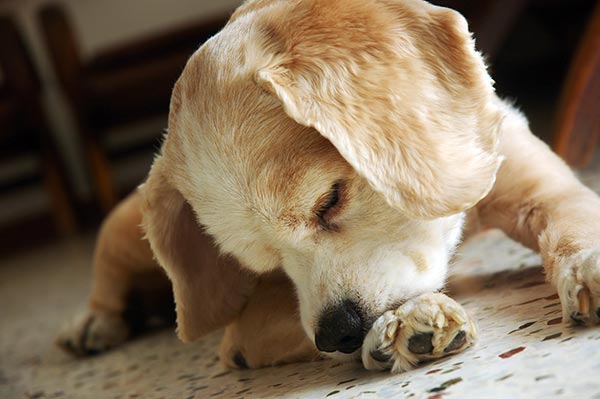Does Your Dog Lick and Chew Their Paws?

That repetitive slurping and nibbling sound your dog is making… You can hear it from across the room! You know the sound— the incessant licking and chewing that your dog does to his paws. If it’s any comfort, it’s not just your dog. Paw chewing and licking is a very common behavior among dogs, but why?
Read on as we discuss why dogs may lick and chew their paws, and how to help.
When It’s More Than Grooming Themselves: What Else May Cause My Dog To Lick and Chew Their Paws?
While some paw licking is just normal clean up, more times than not, there is something else going on. Here are some common reasons your dog may be chomping his paws:
Allergies: Environmental: Environmental allergies are more common in dogs than you may think. If you notice that your dog seems to lick and chew incessantly after being outside or after a good walk, environmental allergies may be to blame. When cleaning your floors, it’s important to consider your pets – some floor cleaning solutions may also trigger an allergic reaction.
- Allergies: Food: Excessive licking that doesn’t seem to associate with any other behaviors could be food allergy related. Some dogs with food allergies also tend to have recurring ear infections.
- Anxiety: Licking: is thought to reduce dogs’ stress hormone levels – which may be linked back to the large amount of time that momma dogs spend licking their pups. Anxiety in dogs can be related to storms, new people, new or loud noises, and age. Some dogs may become anxious as they age due to their memory and thinking ability declining. Some other behaviors you may notice in an anxious dog may be barking, whining, hiding, aggressive behavior, and excessive panting.
- Skin Troubles: Dogs, like humans, can suffer a full range of skin conditions, like dry skin. Dry skin can be itchy, which can prompt your dog to lick. The main cause of dry skin in dogs is over-bathing. Of course, we don’t want a stinky pooch, but too much of a good thing is still… too much. Dog shampoos can strip the natural oils from the fur and skin, which can leave the skin dry and itchy.
- Fleas or Ticks: Indiana has a fairly long flea and tick “season”. Particularly in the late spring and summer months, fleas and ticks can be a real problem for dogs. While fleas and ticks cause some level of irritation for any dog, some are actually allergic, and a single flea bite can become a severely itchy, inflamed patch that can even result in fur loss. Licking and chewing in these instances won’t necessarily just be the feet.
- Pain: Paw licking or chewing may be a sign that your pup is in pain – this could be as simple as a thorn or burr stuck between the toes or an indication of pain further up the leg. In this instance, you may notice your dog limping, favoring a paw, or generally moving slower than usual.
- They Are Bored: Yep, dogs can get bored, just like their humans. Instead of endlessly scrolling social media, our furry friends sometimes defer their boredom by licking their paws. If you are out of the house a lot and maybe can’t remember the last time you played fetch with your pup, it’s possible the licking behavior is out of boredom.
Even a few additional minutes of engagement a day can help. Remember the old saying, “a tired dog is a good dog.”
How To Get Your Dog To Stop Licking and Chewing
The first step in getting your dog to stop licking or chewing their paws is identifying the reason why they are doing this behavior. It’s worth noting that most of the reasons a dog may be licking are worth a vet visit for investigating a potential health issue. Once you’ve resolved the health issues, you should find that for the most part the licking will stop.
In the case of boredom and mild anxiety, adding more interactive play time, force free training, and distractions can help. If your dog is licking and chewing her paws, make an appointment with Academy Animal Hospital to discuss the licking and chewing and what the underlying cause may be.
